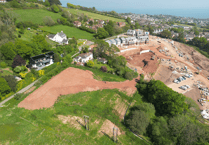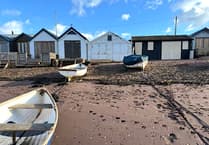CONCERNS have been raised over broken defibrillators in Teignmouth that are still listed as operational.
Fears are that 999 callers could be directed to the life-saving devices while waiting for paramedics to attend heart attack victims.
Cllr David Cox is one of those calling for urgent action.
‘The chances of saving a life drop by 10 per cent every minute after giving cardio pulmonary resuscitation CPR, without the equipment,’ he said.
‘We need to get all the defibrillators working and make sure ambulance service information about their location is up to date.’
Sue Cox of SeaSports, which have a defibrillator installed on their building, said: ‘We are very concerned that our defibrillator is not working.
‘We were pleased to have it and would gladly make a donation to get it working again, however nobody seems to know who is responsible for it.
‘You never know when you are going to need a defibrillator. They are there to save lives, but are worse than useless if not working.’
Defibrillators act as a vital tool in the event of cardiac arrest. Ambulance service 999 staff direct callers to the nearest defibrillator in heart attack scenarios.
The easy-to-use devices offer voice prompts so that even untrained passers-by can use them by placing the pads on the victim and restoring the heart’s rhythm.
Around 30,000 people a year sustain cardiac arrest outside hospital and are treated by emergency services.
If a caller was directed to the out of order device in the event of a cardiac arrest, it could cost lives.
According to South West Ambulance (SWASFT) more than 3,600 people are resuscitated by ambulance staff every year in the South West because they suffer a pre-hospital cardiac arrest.
The ambulance service also said that for every minute that passes once someone is in cardiac arrest, a person loses a further 10 percent chance of survival, and with this dramatic loss in chance of survival, there is a need of a defibrillator every 4-5 minutes walk.
This availability would improve cardiac arrest survival rates throughout the South West.
A spokesperson from SWASFT said: 'We are aware of the two public access defibrillators, located at the Seasports shop and the Yacht Club in Teignmouth. The cabinets for these were originally installed by a local charity – who also provided the funding for the South Western Ambulance Service to provide the defibrillators on a fixed term, supported package. The funding for this package unfortunately ended this year and the defibrillators, which were out of warranty, have been removed. They have also been made inactive on the 999 call system, which means that they would not be considered a resource if someone locally called 999. 'Before the supported term ended this year, we approached both the local charity and the proprietors of the Yacht club and the Seaports shop to discuss the option of renewing our package, which would provide them with a new cabinet (locked cabinets are no longer supported by the Resuscitation Council UK or SWASFT), defibrillator, batteries, pads as well as an annual training session for those requiring it. We believe that the local shop is currently looking into the feasibility of providing a community public access defibrillator at their premises. 'It is important to highlight that SWASFT never list the locations of active defibrillators, publicly. This information though is constantly updated on our 999 call system so that our clinical hub staff can provide anyone calling 999 with the most up to date and relevant advice and guidance.'




